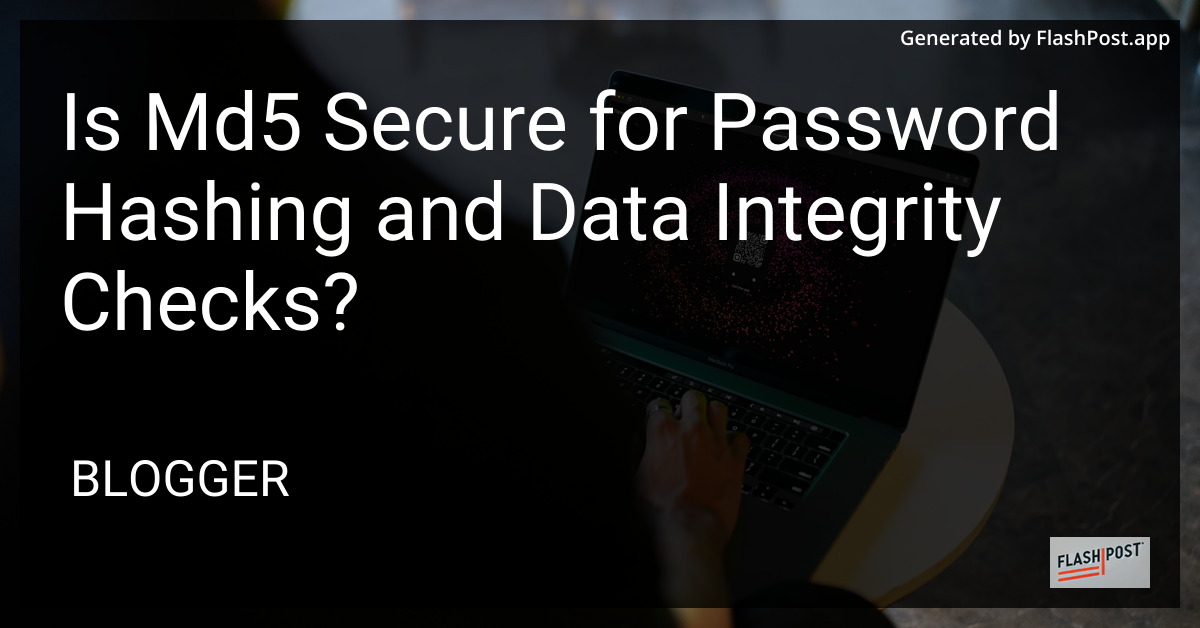Is Md5 Secure for Password Hashing and Data Integrity Checks?

Is MD5 Secure for Password Hashing and Data Integrity Checks?
In the realm of cybersecurity, the use of cryptographic hash functions is critical for ensuring data integrity and secure password storage. Among these functions, MD5 has long been a topic of debate regarding its adequacy for password hashing and data integrity checks. This article aims to provide insights into whether MD5 is secure for these purposes and offers alternatives for those seeking stronger protection.
Understanding MD5
MD5, or Message Digest Algorithm 5, was developed in 1991 to create a 128-bit hash value from input data. It’s primarily used for ensuring data integrity by verifying that the data hasn’t been altered. However, implementing MD5 hashing comes with certain security considerations.
Why MD5 Is Not Recommended for Password Hashing
While MD5 was widely accepted in the past, advancements in computing power have rendered it insufficient for password hashing. The major concerns include:
Speed: MD5 is designed to be fast, which makes it susceptible to brute-force attacks. Malicious actors can easily generate potential passwords and compare the hash values.
Collision Vulnerability: MD5 is prone to hash collisions, where two different inputs produce the same hash. This vulnerability allows attackers to forge data.
Lack of Salt: MD5 alone does not use salting—a technique to add random data to the input of hashing functions. This omission further weakens its security against rainbow table attacks.
For those still considering MD5, especially in programming languages like Ruby or C, it’s crucial to understand these weaknesses.
Alternatives for Secure Password Hashing
Given the vulnerabilities associated with MD5, it is advisable to use stronger hashing algorithms like bcrypt, Argon2, or SHA-256 for password storage. These algorithms are designed to be computationally expensive, which helps to thwart brute-force attacks.
- Bcrypt: Offers adaptive hashing with built-in salting. Bcrypt’s computational cost can be adjusted to keep pace with increasing hardware capabilities.
- Argon2: Recognized for its resistance to GPU cracking and time-memory trade-off attacks.
- SHA-256: While primarily used for data integrity, when combined with techniques like salting and key stretching, SHA-256 can be a viable option for certain applications.
MD5 for Data Integrity Checks
Despite its shortcomings in password hashing, MD5 can still be used for basic data integrity checks. However, it should be avoided in high-security environments or where data tampering is a significant risk. Consider using SHA-256 or SHA-3 for enhanced security in data integrity applications.
For developers interested in learning more about generating unsigned MD5 hash, exploring how to implement MD5 in various languages, or obtaining unsigned hash values, there are many resources available.
Conclusion
MD5’s vulnerabilities make it a poor choice for password hashing and a limited option for data integrity checks. With advancements in cyberattack techniques, it is imperative to adopt stronger and more resilient cryptographic methods. Evaluating your security needs and updating legacy systems with appropriate algorithms ensures data remains protected against emerging threats.
Comments
Post a Comment